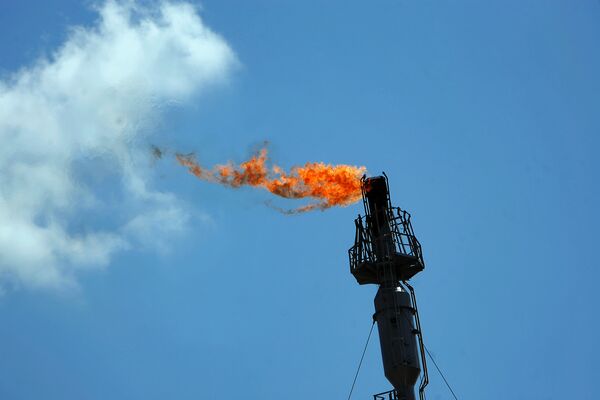MOSCOW. (RIA Novosti commentator Dmitry Babich) - "There has been no change on the gas supply market." In the past few months, this phrase has brought for the EU, Ukraine and Russia more anxiety than calm, because no change means that the question over the supply of Russian natural gas to the EU this coming winter has not been settled.
In early July, the EU's Gas Coordination Group met in Brussels to examine the level of preparedness of the EU and the Energy Community (EnCT) to face a possible gas supply disruption in the coming weeks or months. It established that the gas storage situation in Ukraine remained uncertain, and that it was still unclear who would finance Ukraine's acquisition of the required amount of gas.
Russia is fed up of lending money to the Yushchenko government, which only pokes insults at Russia, and has proposed that the EU provide several billion dollars to the "democratic" Ukrainian government.
Unwilling to part with such a large sum, Europe asked if Ukraine could save itself, or if half of the required sum would suffice.
Kiev and Moscow argue that democracies in a market economy cannot be saved without investment. To paraphrase Vladimir Lenin, any democracy is worth something only if someone can pay for it. In the case of Ukraine, it could be a permanent EU agency such as the European Commission. Its president, Jose Manuel Barroso, has been conducting endless meetings on the issue with his colleagues and pondering over the problem alone, but has so far not approved the allocation of funds to Ukraine.
Mr. Barroso is acting unwisely from the viewpoint of European values and ideology. Why not give money to the young Ukrainian democracy, which has been calling, in unison with some East European EU members, for the need to fight "Russian imperialism"?
However, one can also understand the European Commission president's stance, as such allocations may never be recouped. If West European companies pay in advance for the gas that Russia has not yet supplied to Ukraine, who can guarantee that they will receive the contracted gas?
European companies, which have had negative experience of dealing with Viktor Yushchenko and Yulia Tymoshenko, refuse to believe the two again.
The Ukrainian president and prime minister, the current darlings of the European public, have promised to transit the Russian gas. But they may quarrel again, with Yushchenko again sanctioning searches in the office of Ukraine's national oil and gas firm Naftogaz, as he did last spring, or even halting Russian gas and thereby stopping its transit to Europe.
In this situation, the European Commission has reminded the EU countries of "the need to fill storage units and seek further regional arrangements before any possible new disruption occurs." As of late June, EU storage units contained 4.5 billion cubic meters (bcm) of gas less than in June 2008, according to Swiss investment bank UBS.
Kiev paid for Russian gas supplies in May and June at the last possible moment. Gazprom spokesman Sergei Kupriyanov said that Ukraine planned to dramatically increase gas purchases in July.
Ukraine, which consumed 33 million cu m (mcm) of gas per day in mid-June, has contracted 120 mcm for July.
Does it have enough money to pay for the contracted amount? Ukraine "scraped and scratched" to pay $300 million for gas in June, but Prime Minister Yulia Tymoshenko has recently said that her government was planning to increase the authorized capital of Naftogaz to $2.45 billion.
Ms. Tymoshenko has also said in an interview that Ukraine needs $4.2 billion to buy the required 16 bcm of gas for the country's underground storage facilities, while President Yushchenko said $1.6-$2 billion would suffice.
Which of them is lying?
The European Commission is keeping silent, but Russian sources in Brussels say that even the most tolerant Eurocrats are losing patience with the Ukrainian leaders.
A solution was proposed to the European Commission five years ago. According to it, the EU, Russia and Ukraine should set up a consortium to ensure the transit of Russian natural gas across Ukraine. Unveiled in 2002, the idea of the consortium was an unwanted child for the EU, because it does not conform to its ideology. How can Europe work with Russia and not against it, helping the "new imperialist," which is seeking to restore its former influence in the ex-Soviet countries, in a joint project?
As a result, the consortium kicked the bucket.
Making another go at this policy, the EU signed a separate agreement with Ukraine last spring to modernize its gas transportation system. But its enthusiasm waned when the question of paying for the project was raised.
Maybe it is considering cooperation with the "gas imperialist" ahead of the winter colds?
The opinions expressed in this article are the author's and do not necessarily represent those of RIA Novosti.

